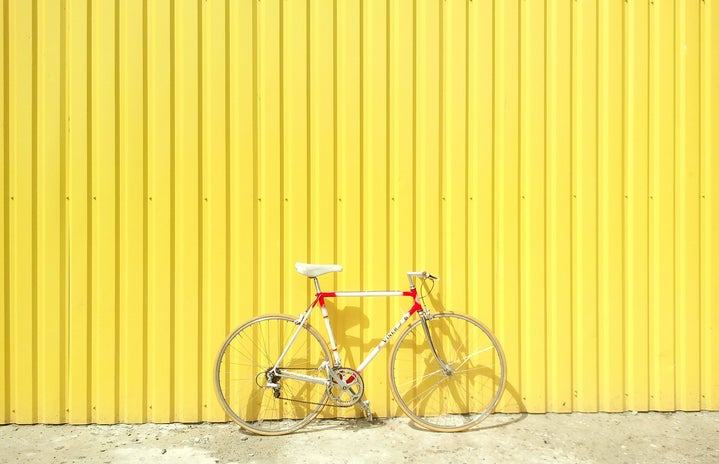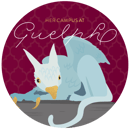I recently had the pleasure of connecting with three wonderful individuals in our Guelph community. From a young age I was taught by my mom to be open, accepting and kind to everyone I meet. These characteristics have followed me into my adulthood and have given me a passion for Feminist activism. I have always been an inquisitive person, constantly captivated by people I see on the side walk or in shops. For me, there is just something so interesting about how people live their lives, I guess this is why I love reality TV, no matter how fake it is! But seriously, I have always loved the idea of walking in someone else’s shoes, to me, nothing could be more authentic and unique. With that being said, I see there is great importance in understanding the LGBTQ2+ community here in our city, and I felt compelled to highlight the lives of a few members of the community. The LGBTQ2+ community represents so many things to many different people, but I think we can all agree that it is about inclusion and acceptance. That’s how I want to approach everyday and new experience. I believe we should celebrate and learn from our differences, we should get to know each other deeply and fully, recognizing that we are stronger together. I have learned so much just by asking my friends in the LBGTQ2+ community simple questions, and I wanted to share some things here with you too. As pride month came to a close I thought there was no better way to highlight the genuine lifestyles of these queer individuals then on our blog, so please enjoy the responses from Amy, Christopher and Oliveigha (it’s pronounced Olivia).
1. State your gender identity (pronouns) and sexual identity.
Amy: Female, Lesbian
Christopher: He/Him
Oliveigha: She/Her, Bisexual
2. Please give a bio about yourself.
Amy: I’m a grad student and a mom. I’ve been working toward my PhD in Applied Social Psychology, studying prejudice reduction, for 4 years now. I had my daughter almost 2 years ago, and life has become quite a balancing act! My wife and I have been together for 10 years this fall, and although we both came to Guelph as students (way back in the day), we’re full-fledge Guelphites now and are so privileged to be raising our family in this beautiful city. In addition to studenting and parenting, I’m an avid food gardener, I keep backyard chickens, and we try to live as sustainably as we can with the resources we have.
Christopher: I work in marketing for the mental health and addictions sector here in Guelph, Ontario.
Oliveigha: I am entering my fourth year of university at UofG- I am studying English, Philosophy and Creative Writing. I am a writer- focusing mostly on screenwriting and fiction. I am obsessed with all things film and am working my way into the industry. If asked to describe myself I would use the words: compassionate, honest, open-minded and motivated.
3. Please describe your coming out story.
Amy: I came out to my dad and my friends on MSN messenger when I was about 15 years old. It was rather uneventful. I consider myself extremely lucky that my coming out was so uneventful, because I lived in a small town and went to a high school of 400 people, and I was the only out gay kid for my entire time at that school. My friends supported me, and even went to my first Pride Parade with me – we had to drive 4 hours and stay in a hotel to attend the nearest parade in London, ON.
Despite how easy it was to come out to my own generation, extended family took a lot longer to be accepting. I came out to my mom following an upsetting dinner at my grandparents’ house. My aunts, uncles, and cousins were there, and everyone started passionately bashing gay people, saying they should be exiled from the country. One even said that gay people should be killed. This was a good, Christian family, but the fear of same-sex attraction ran deep within them and homophobic responses were socialized in them from a young age. While my family spouted this hate, I had to sit there and listen and pretend it didn’t personally impact me. On the drive home, I told my mom how upsetting it was to hear them say those things, and then I told her, “I’m gay.” She said, “I know.” We didn’t have much of a discussion about why my family was so bigoted, but she told me that she accepted me for who I was. She has never been bothered in the slightest about my sexual orientation. It’s worth noting that, a decade later, I received an apology email from one aunt when her more progressive children challenged her homophobia and convinced her to accept me. My uncles have never apologized, but they have all met and love my wife (and daughter), so apparently, they just needed to know and love a gay person to realize that gay people aren’t monsters. My grandparents who were at that dinner died before I got the chance to come out to them, and I regret it.
Christopher: I am one of the lucky individuals to have amazing and supportive parents. I was 18 years old and in my first year of college when I came out. I remember the day like it was yesterday, as it was a life-changing experience. I was sitting at our counter, watching my mother cook dinner. I was home for Christmas break, and just finished my exams in the first semester. I didn’t feel comfortable coming out with who I was right away until I knew what my parent’s reaction was going to be. I didn’t want to lose them, and that was my number one goal.
Growing up in a Catholic family, it was difficult to know how they would react. I told my parents a fake story about a person I knew from high school that came out to their parents. I said it ended up going really bad, and they ended up kicking him out on the street with no money or shelter. My mother who responded first said, “that is awful, they should love him for who he is, being gay doesn’t change anything.”
At the time my father was walking through the kitchen and ended up going into the garage to grab something. The minute she said that, I said to my mom and dad, “I am gay.” It was really difficult, as my father stepped into the garage at the same time I said it, and I wasn’t sure if he heard… I didn’t want to have to say it again because it was so hard the first time. My mother responded as I think any mother would, “are you sure, is it just a phase, etc.” I reassure her it wasn’t, and I was gay. She looked worried, and I was still worried about how to come out again to my father who went into the garage. My father came back into the house, and said the greatest thing, “I don’t really care if you are gay, as long as you have grandchildren for your mother to cuddle up to.” There was a huge feeling of relief that came over me, which I have never experienced something like that again. My mother was a bit emotional for a couple of weeks, not because she was upset with me, but that I would have a harder life. I think no parent wants their child to live a harder life. In the end, though, my family is so supportive of me. That day was a life changer for me, as before that, I was depressed, on medication, and couldn’t deal with being who I was until my family accepted me.
Oliveigha: So, I’ve only been out for about a year, so this story is pretty new. I think what I struggled with a lot in my early youth was the question of whether I should bring it up or ignore it. When I was young I was attracted to women as well as men- but didn’t know if that was “allowed” or where to go from there. I have always had really open minded and loving parents- but because they aren’t members of the LGBTQ+ community we didn’t always talk about different sexualities. I would think that if I was attracted to men that I must just be straight and that was it- so I buried my feelings and pursued men. I then would hear my straight friends talk about how pretty other girls were- so I began to question if I was attracted to them or just admiring them. When I was about 17 I was honest with myself and knew that it was more than just an admiration- that I cared about women and most identities in the same way I care about men. I didn’t want to label it or address it- I have really wonderful open-minded friends who I would always just say ‘eh- not necessarily straight but not necessarily anything else either” and they would leave it at that. No one pushed or made me feel any less of anything- which allowed me to explore this whole thing on my own. What made me come to terms with everything was actually my writing- I started writing a Bi character and giving her traits that I associated with myself. This quickly turned into me doing more research into bisexuality and coming to terms that that was the identity I wished to take on. A few weeks later I told my parents while out to dinner, then slowly one by one I told each of my close friends and my siblings. And then on pride weekend last year I posted on social media that I was bi, so the rest of the world would know. Doing it this way was the best way for me because then instantly everyone else knew and I didn’t have to stand in front of crowds and out myself at every family event and party I went to. If you follow me on social media, then you’d know.
4. Tell me what it’s like being a queer individual in Guelph?
Amy: Guelph is the most accepting place I’ve lived, although I’m aware that I live in a bit of a bubble of university students and hipsters in my neighbourhood. I volunteered for Out On The Shelf, Guelph’s queer library and resource centre, for 3 years. I also volunteered for OUTline and CampOut on campus for several years. Guelph has countless opportunities for Queers to volunteer together. I love how activist this town is, and have never personally heard any anti-gay commentary. In fact, in my Guelph bubble, it seems the gayer you are, the cooler you are.
Christopher: I honestly am so happy to have lived and grown up in Guelph. Yeah, it isn’t perfect, as there isn’t a huge gay community here, but the people in this city are welcoming and supportive. I have never experienced any discrimination here; in fact, it seems like everyone is an ally. I truly love this city, for its acceptance of all people, including the LGBTQ+ community.
Oliveigha: Being bi in Guelph has been interesting for me because I came out after my second year- so for the first two years of my time here I wasn’t out or attending many LGBTQ+ events. Being bi in Guelph is great because people are easily accepting, and I don’t feel forced to out myself at every event. However, the only thing that can be tough is that there are no full-on LGBTQ+ bars in Guelph. We have gay friendly spaces and gay events- but not one explicit place. That is the only thing that I wish we could have more of- like a LGBTQ+ safe space even outside of a bar- like a coffee shop.
5. What is your favourite LGBTQ2+ event in Guelph?
Amy: The Guelph Pride Flag Raising and Community Picnic. It kicks off the Guelph Pride events every year at the end of April/beginning of May, and takes place at City Hall, where city officials show their support for the Guelph LGBTQ2+ community, where children of queer families frolic on the splash pad, and there’s even a beer garden.
Christopher: Sadly, I am not sure what events are in Guelph for the LGBTQ2+ community in Guelph. I used to go to Thursgays at The Albion, but for a 30-year-old… I am not really into the party scene anymore. I would love if there were events for older gay men, as I feel there is a gap in meeting people my own age.
Oliveigha: My favourite event I have been to was QueerSlam- I love slam poetry and listening to artists express their truest forms of themselves. It was an amazing night that allowed for me to feel accepted and loved- as well as connected through the human experience.
6. What would you say to an LGBTQ2+ member struggling with their gender or sexual identity?
Amy: Your feelings are valid. Identity can be SO confusing. But if you can figure out what it is you’re feeling or who it is you are, it opens doors for you. Your confidence can sky-rocket. It gets better.
Christopher: Honestly, it is more difficult keeping it a secret then accepting yourself. I started by opening up to a small circle of friends in college, and gradually got the courage to speak to my parents about it. The more you hide who you are, the more difficult it is to live. It isn’t easy, and may never be depending on who your family and friends are. Realize though that you aren’t alone, there are soooo many allies out there to support you. Remember that there isn’t anything wrong with you, and if people honestly don’t want to be your friend or family anymore because you are gay, that isn’t your problem. Being gay is so surface level, that isn’t who you are as a person. Who cares about who you are attracted to, you are still a good person, who has dreams and wants like any other person.
Focus on your future, how you will be successful, what things you want in life, as this is only a small part of your life right now. I do understand this seems to be huge deal but realize there is such a big world out there, and you live in a country that you have rights and freedoms to be whoever you want to me. Be courageous, and be true to who you are. If people can’t accept you, they aren’t worth your time or energy. Sometimes having a friend or family member with you successfully came out to can be helpful when you are coming out to those who you aren’t sure how they will react. Be strong!
Oliveigha: To me the best thing I was told was to treat myself kindly. At the point of understanding your identity, whether sexual, gender or anything else, the most important thing is to give yourself the space and time to get to the point of understanding. We are a society so obsessed with labels and fast paced decisions that we often don’t just sit with ourselves and look within. Your label or your identity isn’t set in stone either- you can believe yourself to be one thing one day and then grow as a person and understand your identity is not what you first thought it was. So, I think the best advice right now is to take as much time as you need, treat yourself kindly and be open to everything and anything. If you a true to yourself, you can never be wrong.
7. What does the Pride Parade mean to you? Please draw on a personal experience you’ve had at Pride in the past.
Amy: The Toronto Pride Parade has never really been “my thing.” I don’t like crowds, or the Big City. However, the few years I did attend, I felt empowered by the sheer numbers of queer people filling the streets. In those moments, it felt like the majority of the population was queer, and the straight people were the outsiders looking in. It was an invigorating experience.
Christopher: Pride to me is coming together to remember where we came from, and where we are going. During pride, I take time to reflect on those who came before me to fight for the freedoms I have today. Without their struggles and sacrifices, I would probably a closeted man, in a world that condemns me for who I love. It’s still not perfect, so that is why I think pride is so relevant today, as we have to think forward and work to make every country and people understand that being LGBTQ2+ isn’t a bad thing, it bring society closer and creates a place of love and acceptance. Pride is also a time where I give thanks to all the allies who helped me gain my freedom, specifically the amazing women in my life and who were apart of supporting the community. Without the brave women who helped us with our own suffrage movement, we wouldn’t be where we are today. This is why today I have so much respect for women, as they are truly allies that helped up move forward in our freedoms
Oliveigha: I’ve only been going to Pride for the last few years but the whole month of Pride gives me more reason to celebrate. More reason to reflect on my own identity and celebrate that of others and myself. I love the Pride festivals because they bring people together through love and understanding. When you go to Pride you feel at home- you feel accepted for however you look/express/etc. Pride festivals and events are wonderful places for everyone to go to just to feel like they can be true to themselves. I like the Pride Parade and that it gives people something to celebrate and for people to show their support. However, I do struggle with how corporate Pride has become- wishing it was more about celebrating individual identities then reminding everyone that ‘TD loves the gays’.
8. And finally, what is it the most important thing family members need to know about their LGBTQ2+ sister/brother/cousin/and so on?
Amy: As a friend/family member of an LGBTQ2+ person, your support and love goes the farthest toward their wellbeing. Allies are of the utmost importance to making the world a safer, better place for marginalized folks.
Christopher: It isn’t easy to see your child or loved one be something that you didn’t think they are. I understand when your child or loved one comes out as being LGBTQ2+ that is can be shock. My advice is, don’t focus on what other people may now think of your family, don’t focus on the hardships that you will endure, as the child/loved one will face it much harder. Surround that person with love and care. Be courageous to fight alongside them. Realize there isn’t a cure for this, and it isn’t a way of life style. It is who they are. Educate yourself. Be there for that individual. Don’t treat them any different. Realize they are just the same as you. They want to love and be loved.
Oliveigha: That they’re the same person you’ve always known. Their gender and sexual identity doesn’t make them any less the person who you love. We have been this person, and this identity, the entire time but we are now only putting a label on things. That label doesn’t change anything. Just because we come out doesn’t make us any less family than we were before.



